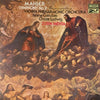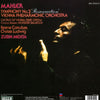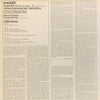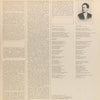







Mahler - Symphonie n° 2 en ut mineur "Résurrection" - Zubin Mehta, Ileana Cotrubas, Christa Ludwig (2LP)
ORDER LIMITED TO ONE ITEM PER CUSTOMER
Gustav Mahler - Symphony No. 2 In C Minor "Resurrection"
The Vienna Philharmonic Orchestra
Chorus Of Vienna State Opera
Ileana Cotrubas, soprano
Christa Ludwig, mezzo-soprano
Zubin Mehta, conductor
Norbert Balatsch, chorus master
2 LPs, Gatefold jacket, includes digital download
Edition limited to 2,000 copies
Original analog Master tape : YES
Heavy Press : 180g Virgin Vinyl
Record color : black
Speed : 33 RPM
Size : 12'’
Stereo
Studio
Record Press : The Netherlands
Label : Pro-ject
Original Label : Decca
Recorded February, 1975 in the Sofiensaal, Vienna
Engineered by Colin Moorfoot, Jack Law, James Lock
Produced by Ray Minshull
Remastered at Abbey Road Studios
Originally released in 1975
Tracks:
Side A:
- I. Allegro maestoso. Mit durchaus ernstem und feierlichem Ausdruck
Side B:
- II. Andante moderato. Sehr gemächlich
- III. 3. Scherzo: In ruhig fliessender Bewegung
- "Urlicht"
- IV. "O Röschen rot! Der Mensch liegt in grösster Not!" (Sehr feierlich aber schlicht) - "Urlicht" 2
Side C:
- Im Tempo des Scherzo
- 5a-b: Im Tempo Des Scherzo, Wild Herausfahrend
Side D:
- Im Tempo des Scherzo
- Sehr Langsam Und Gedehnt
Reviews:
"Even though this recording was made in 1975 it was only the third time the Vienna Philharmonic had recorded a Mahler symphony in a studio. For many years Zubin Mehta only conducted the first five Mahler Symphonies as he was on record as admitting he didn't understand the ones that followed. Don't see this as a reason for being uneasy about his commitment to Mahler, though. I think it shows a realisation that each Mahler symphony is different and that some conductors are not suited to some of them. His Second is a contender in a very crowded market not least for this re-issue being at medium price on a single disc.
Mehta takes an admirably fleet view of the first movement, rightly stressing the Allegro marking in a challenging and sometimes fierce conception. The dynamics of the strings are brought out to the full at the start and right the way through and even the lovely ascending secondary theme has a spring in its step. At the opening of the first development the rapt lyricism of the Vienna Philharmonic's playing is a joy also with air around the music that seems to lift it on its way. In the approach to the catastrophic climax that will being in the Recapitulation Mehta allows his tempo to drop down for effect and then speed up prior to the crashing chords themselves which emerge clean and lean. However, this is a point at which the character of the sound recording makes its presence felt. It's a very compartmentalised sound picture, not as rich in the bass as it could be.
An excellent account of the second movement then follows and Mehta really understands how this music must take the "sting" out of the first movement. The Vienna Philharmonic strings again play "to the manner born" so note the cellos' playing of the counter melody at 86-132 for a real "Mahler moment". At 29 Mahler writes: "Do not hurry" and Mehta observes this warning to great effect so the marking "Energetically moving" that comes in at 133 makes an even greater impression when delivered as sharply as this. Vivid timpani strokes herald the third movement in which Mehta shows a feel for Mahler's quirkiness with lyrical themes pitted against bitter interjections from brass, snaps of the rute, and the unforgettable trumpet solo at the core delivered beautifully. No one quite approaches Klemperer as an interpreter of this movement for me, though. Only he seems to get the full measure of this piece, not least in what Mahler described as the "Cry of disgust" that marks a crucial "way point" towards the end. Mehta just fails to overwhelm here, as I'm sure he should. This leads me to wonder whether what is missing in this recording, as in so many studio recordings of this work, is the extra element "live" performance brings in this above all of Mahler's works. As the final note of the movement drifts away we are left with Christa Ludwig to intone "Urlicht" which she does with a dark grandeur aided by a sumptuous accompaniment from Mehta and the orchestra which I found impressive.
The last movement bursts on us well though a little more richness from the recording again would have helped. However, one positive aspect of the sound recording now becomes apparent in the distant horn calls - Mahler's "voice in the wilderness" - that follows. The placing of Mahler's directional effects - offstage horn calls and band music - is brilliantly done in this movement with great care taken to create an aural stage between our speakers that adds lustre to Mehta's performance. His account of the march (220-88) sees him pressing forward but there is never any sense of rush. The weight in the music is there, but I don't think he achieves the sense of explosive tension that can build up as the movement reaches its two great climaxes, the second preceded by that remarkable passage with the offstage band crashing away, capping the first. Again Klemperer pulls it off, so does Bernstein and Rattle. But I do like the way Mehta clears the scene with some magical string playing prior to the "Grosse Appel" where offstage fanfares sound against on-stage flutes signifying the last sound hear on earth prior to judgement day. This is balanced superbly by the Decca engineers working in their old haunt of the Sofiensalle in Vienna.
One major gripe here and it's something that has always annoyed me in this recording. A double bar line separates the last chord of the flute and piccolo on stage and the brass off stage from the entry of the chorus a capella. Mehta, however, completely ignores this and has his chorus enter at the moment the instruments stop playing. Apart from ignoring Mahler's marking this completely ruins the wonderful effect Mahler was clearly aiming at and I cannot understand why Mehta did this. A major blot on a key moment in the whole work especially as the chorus sing magnificently with some wonderful basses especially impressive. Mehta's sense of theatre does return as he proceeds to the "Resurrection" coda that maintains the symphonic argument but is grand and reflective in equal measure.
This is a fine studio version of a work that demands "live" recording. Mehta's view is more in the Walter tradition in that he takes everything at face value but is none the worse for that. The sound is not without problems. Everything is contained with ease but there's a "manufactured" quality, which troubles me even though it benefits from superb placing of effects. But the presence of the Vienna Philharmonic is a plus, as is the fact that the work is contained on medium priced disc.” Tony Duggan, Musicweb International
Ratings:
Discogs : 4.27 / 5


